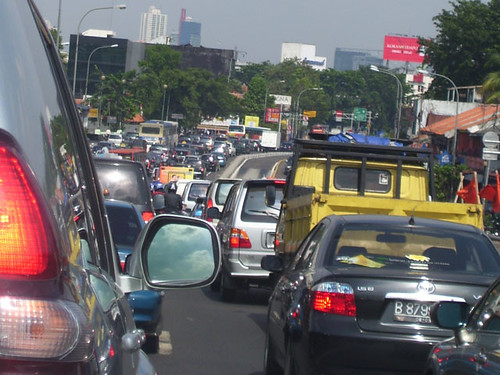Grinding to a halt! ITDP brings to fore key transportation issues facing Jakarta, Indonesia
(Source: Institute for Transportation & Development Policy)
Activist Says Jakarta Current Vehicle Growth Leads to Transportation Failure
If the vehicle growth rate in Jakarta continues to hover around tens of percent annually without any breakthrough in transportation and traffic management, the city will be paralyzed by total gridlock by 2014, a nongovernmental organization said Wednesday.
“Total traffic failure is an unbearable risk caused by the city’s failure in transportation and traffic management,” the Institute for Transportation and Development Policy said in a statement sent to The Jakarta Post.
“Traffic jams have degraded the environment and people’s health due to excessive vehicle emissions. They also halt residents’ mobility that, in turn, cause economic losses,” it said.
Jabodetabek, a large-scale metropolitan area with a population of 21 million, consists of Daerah Khusus Ibukota/DKI (Capital Special Region) Jakarta, as the capital city of Indonesia, which is the center of politics, economy and social activities, and 7 local governments (Bodetabek) in the surrounding areas covering Kota (municipality) Bogor, Kabupaten (regency/district) Bogor, Kota Depok, Kota Bekasi, Kabupaten Bekasi, Kota Tangerang, and Kabupaten Tangerang.
Traffic congestion is a chronic problem faced in the Jabodetabek region and the situation is expected to worsen should there be no improvement of any kind made on the existing transportation system. According to a 2005 study, the economic loss caused by traffic congestion in the region could be as much as $ 68 million per year due to traffic congestion – and this estimate excludes the impacts of traffic congestion and pollution on human health.
Jakarta’s Paratransit Network Still Stuck In Slow Lane
Focussing on plans for modern subways, rapid-transit buses or express trains, while Jakarta delays overhauling its Metro Mini, Kopaja, angkot and mikrolet networks, the administration is just sweeping dirt under the rug.
At a recent meeting with city councilors, Governor Fauzi Bowo proudly reported Jakarta’s priority program of continuing to develop the BRT (rapid transit buses) network as well as the proposed subway, but nothing was said about the existing semi-formal modes of public transportation – the “paratransit” system.
Well, pardon me governor, the key to overhauling the city’s transportation system lies not in modern technology alone: It is about the addressing the system as a whole, while slowly introducing a new transportation backbone. This involves harmonizing existing means into a working network – not an overlapping one.
Sure, the paratransit system is meant to act as feeder lines for the BRT network, but how?
Jakarta’s last effort to synchronize existing microbuses and public minivans involved trying to introduce a single-ticket system for the feeder and BRT buses – an approach that failed not long after its introduction, and which has never been replaced with other initiatives.
They do say that transportation issues have more to do with political tendencies than technicalities.
But what makes it so hard to deal with the existing paratransit system and why does the Jakarta provincial government rather focus its energy in developing the new BRT and subway projects?
Transportation in Jakarta is so tied up with conflicting interests that overhauling it has become extremely complicated.
Officially, it seems non-physical projects such as integrating Kopaja and angkot benefit no one (financially that is) and this is a large part of the reason that the paratransit system is being ignored.
Turning back the clock a little to when the government chose to focus on building roads and highways (one of the consequences of Indonesia becoming a Japanese automakers’ production hub), our city buses and angkots were left on their own.
Jakarta Wants Less Cars, More Days
The city administration has expanded its controversial car-free day program from just once a month to twice monthly.
The Jakarta Environmental Management Board, or BPLHD, announced on Thursday that it had scaled back the ban on vehicles on the main Jalan Sudirman-Jalan Thamrin thoroughfare during the last Sunday of every month, but would now bar traffic from other parts of the city on the second Sunday of every month.
“We received many complaints from people whose activities were disrupted so we gave up and reduced [the closure] by two hours,” said BPLHD head Peni Susanti.
Speaking at a press conference to outline the changes, Peni said traffic would now be barred from Sudirman-Thamrin between 6 a.m. and noon, bringing forward the previous finishing time of 2 p.m.
On a rotational basis, the second Sunday of each month would see traffic restrictions enforced during the same hours in areas such as Jalan Rasuna Said in South Jakarta, the Kota area of West Jakarta, Jalan Danau Sunter in North Jakarta, Jalan Pramuka in East Jakarta and Jalan Soeprapto in Central Jakarta.
During the car-free days, only the TransJakarta busway would be allowed to use the main roadways, while other public transportation and private vehicles must use the slow lane.
Peni said the aim was to improve air quality by reducing pollution from traffic, and to encourage more efficient use of cars.
Air-quality evaluations conducted during car-free days have shown significant drops in pollutant concentration levels, with dust particles reduced by 34 percent, carbon monoxide by 67 percent and nitrogen monoxide by 80 percent.
“Those three parameters are the primary pollutants from motor vehicles,” Peni said. “Motor vehicles are still the biggest polluters in Jakarta.”
Slamet Daryoni, the interim director of the Jakarta branch of the Indonesian Forum for the Environment, or Walhi, however, said that the car-free day program was ineffective.
One Project At A Time Keeps Congestion Away, Experts Say (Jakarta)
Jakarta’s administration should focus on one public transportation project at a time, to avoid projects being half completed and unsuccessful, like the waterway and monorail projects, urban planning experts said Wednesday.
Despite worsening traffic conditions in the city, the administration has not yet managed to develop any form of efficient public transportation, said urban planning expert Yayat Supriatna.
“The administration is inconsistent in developing transportation systems. It should prioritize and focus on completing one project before starting another,” he said, citing several unfinished projects.
Despite the monorail project not being completed, the administration went ahead with building the waterway, which has been considered a failure.
“Existing modes *of transportation*, such as the Transjakarta bus, have yet to be optimized by the administration. To some extent, they only create new traffic problems,” Yayat said.
The administration has been planning to build the monorail project since 2003, erecting pillars in the middle of several main streets. However the project is now in a deadlock due to legal and financial problems.
Yayat said the project was still feasible, but needed stronger commitment from the administration and the company consortium.
Furthermore, he warned administrative uncertainties in transportation projects could lead to stakeholder distrust and hamper the improvement of the entire system.
The Institute of Transportation and Development Policy (ITDP) said the city’s infrastructure could not catch up with the growing number of vehicles.
The group estimated that if vehicle growth rate continued to hover around an annual two-digit percentage without any breakthrough in transportation and traffic management, the city would be paralyzed by 2014.













